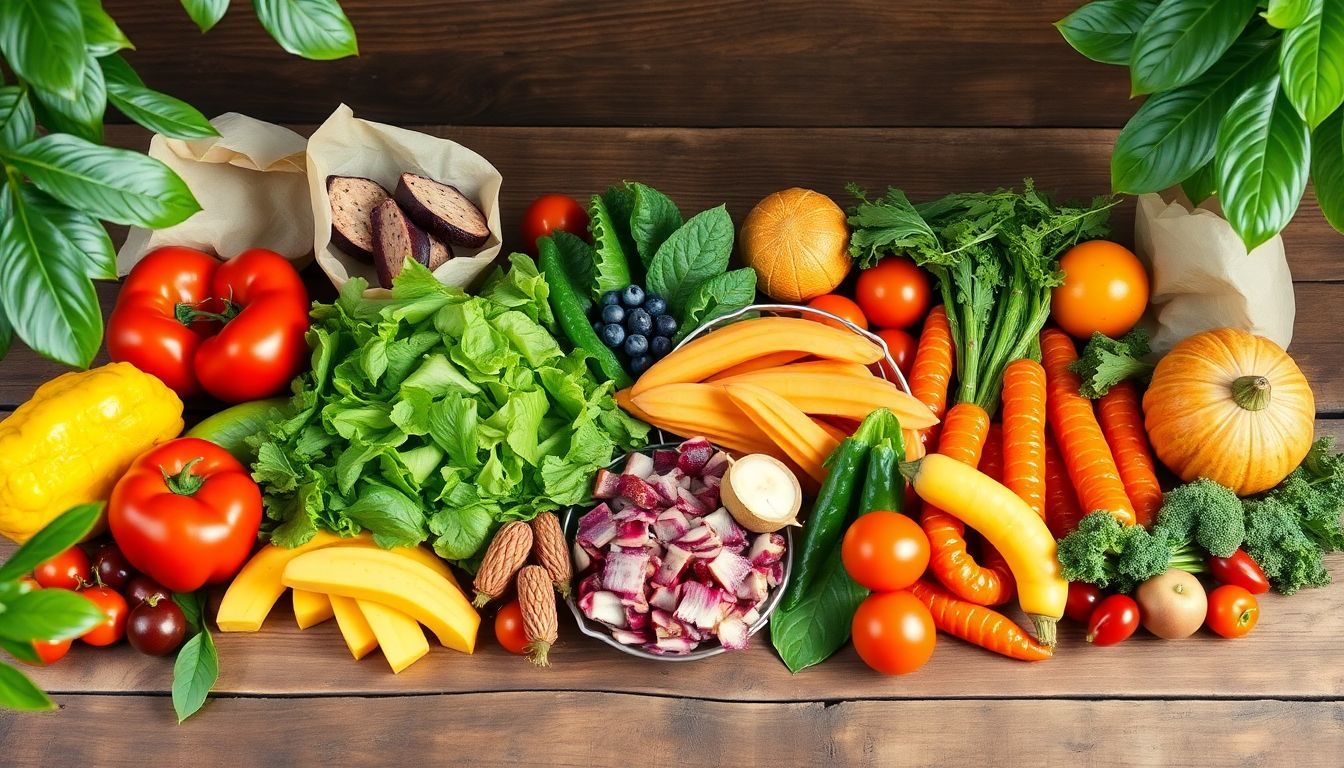Eating habits can affect your risk of colon cancer. Studies show that a vegetarian diet may help lower this risk. This blog will explain how plant-based foods support colon health and cut cancer risks.
Thank you for reading this post, don't forget to subscribe!Keep reading to learn more!
Key Takeaways
- Vegetarian diets lower colon cancer risk by up to 22%, as shown in studies like the Adventist Health Study-2.
- High-fiber foods, such as whole grains, fruits, and vegetables, support digestion and reduce colon inflammation.
- Antioxidants in colorful produce like berries and spinach protect cells from damage linked to cancer development.
- Eating less red meat and processed meats lowers exposure to carcinogens that raise colorectal cancer risks.
- Gradual steps like Meatless Mondays or swapping meat for beans can help transition to a plant-based diet easily.
The Link Between Vegetarian Diet and Reduced Risk of Colon Cancer
Switching to a vegetarian diet may lower your chances of getting colon cancer. Studies show plant-based diets, like vegetarianism, support gut health and reduce cancer risks.
Studies suggesting a significant link
Several studies have shown vegetarians have a lower risk of colon cancer. Research published in major journals found that vegetarian diets reduce the risk by up to 22%. These findings highlight how plant-based diets help protect against colorectal cancers.
People who eat less red meat or processed foods often see better colon health.
Data from large cohort studies support this connection. Diets rich in fruits, vegetables, and whole grains provide dietary fibers and antioxidants that fight cancer cells. Meanwhile, high meat consumption—especially red meats like beef or bacon—has been linked to higher risks of colonic cancer due to carcinogenic additives used during salting or cooking processes.
Characteristics of a vegetarian diet
Plant-based diets focus on whole foods like vegetables, fruits, legumes, grains, and nuts. These foods have high levels of fiber that promote colon health by improving digestion and reducing inflammation in the large intestine.
Vegetarians avoid meat from mammals, which is linked to carcinogenicity. Many also reduce or skip processed meat entirely—known to cause cancer with regular consumption. Instead of heavy fats from animal products, plant-based options provide nutrients like omega-3 fatty acids found in nuts and seeds.
Antioxidants in colorful produce help prevent damage to cells over time.
A diet rich in plants supports a healthy gut microbiota while lowering cancer risks.
Factors Contributing to Reduced Risk
Eating more plants cuts cancer risk. Natural compounds in veggies help protect your colon.
High intake of fiber
A high-fiber diet lowers the risk of colon cancer. Fiber helps move waste through the digestive system, reducing inflammation in the colon. Whole grains, fruits, and vegetables are excellent sources of fiber.
These foods also produce butyrate—a compound that protects against colorectal cancer.
Consuming at least 25-30 grams of fiber daily benefits colon health. Studies show plant-based diets rich in fiber reduce cancer risk more than meat-heavy diets. Avoiding processed meats and increasing whole foods like beans or lentils can make a big difference for long-term prevention.
Presence of antioxidants in fruits and vegetables
Fiber isn’t the only protective part of plant-based diets—antioxidants play a big role too. Fruits and vegetables are packed with these compounds, which fight damage to your body’s cells.
This can lower the risk of colon cancer and help protect overall health.
Colorful produce like berries, spinach, carrots, and broccoli contains high levels of antioxidants such as vitamins C, E, and beta-carotene. These nutrients may prevent harmful changes in cells that lead to colorectal cancer.
Eating a wide variety of fruits and vegetables boosts antioxidant intake while supporting a healthy diet.
Statistical Evidence Supporting the Link
Vegetarian diets are linked to a lower risk of colon cancer. Numbers and studies back this connection, showing the real impact of plant-based eating habits.
| Study/Source | Key Findings |
|---|---|
| Adventist Health Study-2 (AHS-2) | Vegetarians had a 22% lower risk of developing colorectal cancer compared to non-vegetarians. |
| World Cancer Research Fund (WCRF) and AICR Report | High-fiber diets—common in vegetarian eating—are strongly protective against colon cancer. |
| Clinical Nutrition Journal, 2015 | Significant correlation found between vegetarian diets and lower rates of colon cancer in long-term observations. |
| British Journal of Cancer, 2011 | Plant-based diets, rich in fruits and vegetables, reduced colon cancer risk by up to 19%. |
These findings highlight the role of plant-based eating. Individuals benefit from protective nutrients like fiber and antioxidants by focusing on fruits, vegetables, and legumes.

Encouraging Adoption of Vegetarian Diet
Switching to a vegetarian diet can feel easy with small, steady changes. Focus on adding more fruits, veggies, and whole grains to your meals daily.
Making informed dietary choices
Choosing what to eat impacts colon health. A plant-based diet with fruits, vegetables, and whole grains lowers cancer risk. Reducing red meat and avoiding processed meats like ham helps too.
Studies link high-fiber diets to lower cases of colorectal cancer.
Check for risk factors like family history of colorectal cancer or inflammatory bowel disease (IBD). Limit alcohol consumption and maintain a healthy weight to reduce risks further.
Regular screenings, such as colonoscopies, can also detect issues early.
Transitioning to a vegetarian diet
Switching to a vegetarian diet can feel like a big change, but it doesn’t have to be overwhelming. Start small and make gradual adjustments until it fits your lifestyle.
- Reduce meat consumption over time. Begin by cutting out red and processed meat from one or two meals every week. This approach lessens the shock of sudden diet changes while helping lower colon cancer risks tied to high meat intake.
- Add more fruits and vegetables to daily meals. These are rich in fiber and antioxidants, which aid in cancer prevention and improve colon health.
- Replace meat with plant-based protein sources like beans, lentils, tofu, or tempeh. These provide essential nutrients without increasing cancer risk factors linked to meat consumption.
- Try whole grains such as quinoa, brown rice, or oats instead of ultra-processed foods. Whole grains support digestion and contribute to a high-fiber diet that promotes colon health.
- Experiment with vegetarian versions of your favorite dishes. For example, swap ground beef in tacos for black beans or use mushrooms instead of chicken in stir-fries.
- Explore balanced diets like the Mediterranean diet or vegan diet if you want diversity in your meals while reducing body mass index (BMI) and improving overall health.
- Limit dairy if you’re aiming for a vegan path but still enjoy options like almond milk or soy yogurt for vitamin D and calcium.
- Find alternatives for omega-3 fatty acids typically found in fish by eating flaxseeds, walnuts, or chia seeds—ideal choices for pescatarians transitioning further.
- Plan meals ahead to avoid relying on fast food or processed snacks during busy days. Being prepared can prevent setbacks during this journey toward healthier eating habits.
- Set clear goals based on your personal needs—whether it’s weight loss, lowering alcohol consumption, or simply enjoying better colon screenings through healthier choices!
Simple steps to start a vegetarian diet
Starting a vegetarian diet can feel challenging, but small steps make it easier. Gradual changes can help you create lasting habits for colon health.
- Start with Meatless Mondays. Replace meat-based meals with plant-based recipes once a week to ease into the habit. It’s an easy way to explore vegetarian options without drastic changes.
- Swap meat with plant proteins like beans, lentils, or tofu. These foods are rich in fiber and protein—great for reducing colon cancer risk.
- Incorporate more fruits and vegetables into your meals. Aim for colorful plates filled with a variety of produce to boost antioxidants and nutrients.
- Opt for whole grains like brown rice, quinoa, or oats instead of refined carbs. Whole grains improve digestion while adding vital nutrients.
- Try vegan dairy alternatives like almond milk or cashew cheese if you want to avoid animal products entirely.
- Keep snacks simple with nuts, seeds, or fresh fruit on hand for quick energy boosts during the day.
- Pay attention to ingredient labels carefully when grocery shopping to avoid hidden processed meats in packaged goods.
- Plan your meals ahead using online recipes crafted for vegetarians or pescetarians if seafood remains part of your diet.
- Explore local farmers’ markets for fresh produce while supporting sustainable practices that benefit environmental health too.
- Seek guidance from a nutritionist if needed to ensure balanced meals packed with omega-3 fatty acids and key vitamins like B12 often found in eggs or supplements within vegan diets.
Conclusion
Switching to a vegetarian diet can be a game-changer for your health. It lowers cancer risk and boosts overall colon health. Packed with fiber, antioxidants, and nutrients, plant-based foods fight harmful factors tied to cancer.
Small steps like eating less meat or trying more veggies can make a big difference. Your body—and your future—will thank you!
